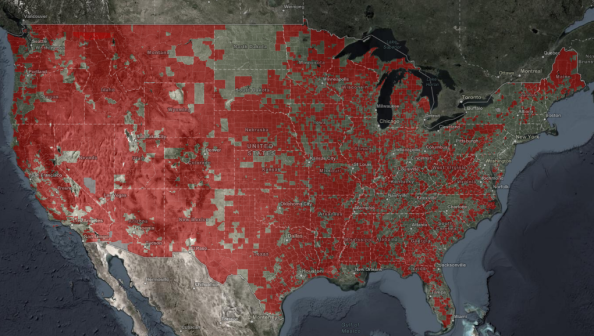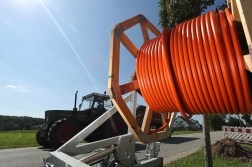NTIA awards $930M in ‘middle-mile’ broadband grants

The Biden administration announced Friday it’s preparing to distribute $930 million for 35 broadband construction projects around the country aimed at building out the “middle-mile” infrastructure that connects large, regional fiber networks to the local networks that reach individual homes and businesses.
The middle-mile fund is the smallest component of the administration’s $45 billion “Internet for All” agenda, which also includes the $42.5 billion Broadband, Equity, Access and Deployment program, which is expected to be awarded to states later this month. But Alan Davidson, head of the National Telecommunications and Information Administration, which is running the Internet for All program, called the middle-mile funding a “force multiplier” during a call with reporters Thursday.
While BEAD funds will go to support major new broadband projects over the next several years, the middle-mile component is essential to carry large volumes of internet traffic over long distances, Davidson said.
“The middle-mile program is a force multiplier in our efforts to connect everyone in America,” he said. “Today, in 2023, here in America, millions of people across the country still lack access to a high-speed internet connection, or lack the skills and the means to use it. And that is about to change.”
The middle-mile initiatives awarded Friday include multi-state projects to lay down hundreds of miles of fiber reaching into deep agricultural territory, undersea routes to Hawaii and empty desert around military bases in the West. Among the projects administration officials singled out was a 431-mile open-access network running through eastern Nevada, aiming to provide a public internet connection to Nellis Air Force Base, outside Las Vegas. The NTIA awarded that project $43.5 million. A project to install 137 miles of fiber across a 13,000-square-mile chunk of Montana received $11.8 million. And a power cooperative serving dairy-producing regions of Iowa, Minnesota and Wisconsin is getting nearly $15 million to retrofit 240 miles of fiber for modern, high-speed service.
Davidson said that in addition to the $930 million his agency is giving out, the recipient organizations put up matching funds totaling another $848 million.
The NTIA fielded more than 260 applications, totaling nearly $7.5 billion. Federal officials fielded applications through Sept. 30 of last year, though some regions affected by natural disasters got an extension through Nov. 1.
The middle-mile funding, along with the rest of the Internet for All program, was created as part of the $1.2 trillion Infrastructure Investment and Jobs Act that President Joe Biden signed in late 2021. The law included a total of $65 billion in broadband funds, representing the federal government’s single-biggest investment in high-speed internet.
“Not only can these networks reduce the spending required for last mile deployment, but they can improve network resilience in the face of the climate crisis, and increasing natural disasters like wildfires, floods and storms by creating multiple routes for the internet traffic to use instead of just one,” Mitch Landrieu, a senior Biden adviser and the White House’s infrastructure coordinator, said on Thursday’s call. “It’s like a detour on the freeway, but the highway is for our data.”
Earlier this week, Landrieu and Agriculture Secretary Tom Vilsack announced the distribution of $714 million in IIJA funds for new rural broadband projects spanning 19 states.






